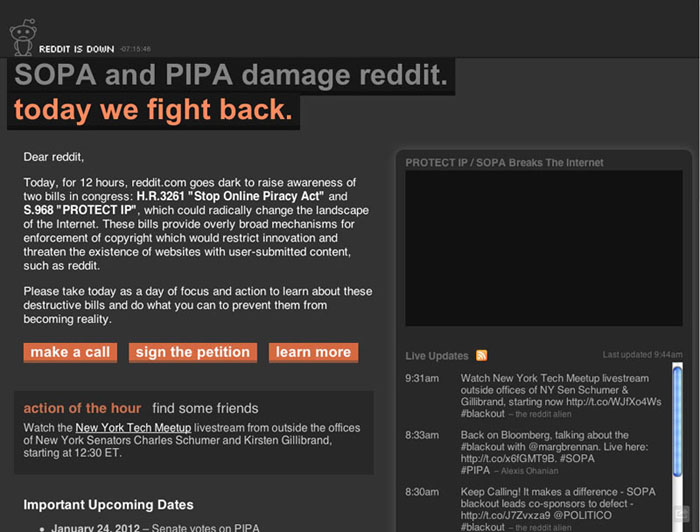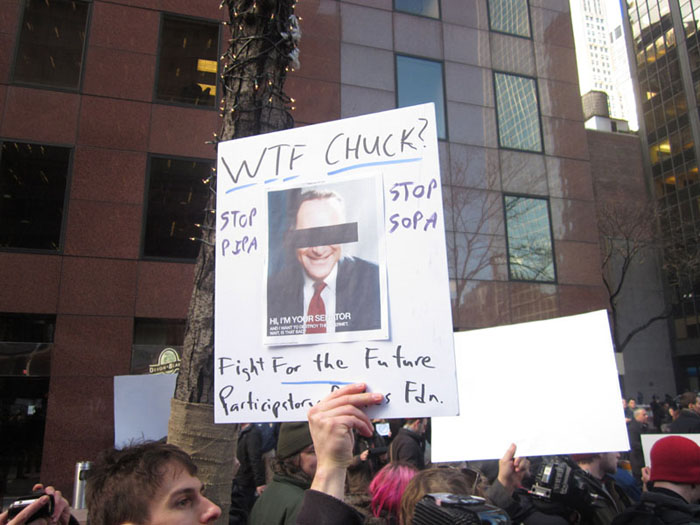Hacking Politics: How Geeks, Progressives, the Tea Party, Gamers, Anarchists, and Suits Teamed Up to Defeat SOPA and Save the Internet (38 page)
Authors: and David Moon Patrick Ruffini David Segal
Tags: #Bisac Code 1: POL035000

It all boiled down to one thing. At a time when the American economy was still finding her swagger, our sector was growing, hiring, and leading the world in innovation. I wanted to be sure each person in that room imagined a constituent back in their home district not unlike me or my peers, who could be the next great entrepreneur—prematurely squelched by some thoughtless legislation. Or as many redditors repeated: “Jobs. Jobs. Jobs.”
No one, no matter how much or how little he or she understood about technology, wanted to be responsible for threatening the already weakened U.S. economy.
It was the same message I brought to a meeting of New York tech executives hosted by tumblr a couple weeks later. I was surprised by the chosen date, but apparently I was the only one celebrating SantaCon that day. Nonetheless, before celebrating with hordes of my fellow Kringles, I took a seat and we went around the room, volunteering contributions from our websites that might help spread the word about SOPA and PIPA.
Today, reddit is one of the 100 most popular sites online, but it’s rare in that the platform is rather open—much like the Internet itself. My offering was simple: we’d present the threat to the reddit community and give them our rationale behind the opposition. I didn’t know how our millions of users would react to the imminent threat, but I knew the best ideas for action wouldn’t come from me or even this room of “experts.” The best idea would come from the crowd. The magic of reddit comes from an appreciation Steve and I had from the day we launched—nothing would work without a truly empowered community. So we’d guide people to a common subreddit (r/SOPA) and see what bubbled up.
I posted a quick YouTube video explaining why I was publicly in opposition: “The story of reddit, where Steve Huffman and I started it from an apartment in Medford, MA with 12k in funding from Y Combinator simply could not have happened in a world with this bill … and it’s not just reddit, it’s every single other social media site out there that would be threatened by this bill. And that is devastating. It’s something we simply cannot afford to do from an economic standpoint.”
An unprecedented display of democracy in action culminated on January 18, with simultaneously offline and online protests. Before our eyes, we saw what most Washington insiders called a “sure thing” become the biggest upset they could recall. This all happened thanks to the millions of empowered Americans using the very social media platforms we wanted to protect along with our Internet freedom.
Wikipedia going dark on January 18 in protest of SOPA and PIPA made the story unavoidable for the mainstream media, but it was volunteer moderators of the most popular subreddits who first advocated for the blackout. Enough moderators agreed to go dark, that the administrative team at reddit announced an overall blackout of the site. They would replace the stream of popular links and discussions with calls to action on how to stop SOPA.

On January 18, 2012, the homepage of Reddit.com went black and carried a message asking users to take action against SOPA/PIPA.
It was a leaderful movement indeed. Anonymous redditors pushed reddit into being the first of thousands of sites, including Wikipedia and Google, to take action on that fateful day. Similarly, another redditor suggested a boycott of
GoDaddy, which supported the bills for long enough to feel the wrath of a coordinated domain transfer away from their service before relenting and apologizing for backing the legislation. As people called their senators and representatives to argue their position, they shared their stories online, encouraging others to do the same.
Thanks to the millions of individuals who engaged and took action for something they believed in, Internet freedom was preserved (at least for the time being). It is my hope that this success is only the first of many triumphs of citizens over lobbying dollars. Even a startup founder like me who has no business in politics found a way to be helpful in this fight, which is sadly far from over. Remember: our politicians work for us. Make sure you’re being a good boss—make sure they remember, as my favorite protest sign read: “It’s no longer OK to not know how the Internet works.”
DAVID SEGAL
We kept hearing that we should target our messaging at Senator Chuck Schumer ( D-NY), given his particular sensitivity to potential political liabilities for Democratic Senate candidates. Schumer, the third-ranking Democrat in the U.S. Senate, previously served as the Chair of the Democratic Senatorial Campaign Committee where he’d been in charge of getting Democrats elected to the Senate. He is still incredibly ambitious, angling to be the leader of Senate Democrats once Harry Reid retires, so he needs to pay attention to changing political currents.
A coalition of Internet freedom advocates, many from the burgeoning New York Silicon Alley tech scene which Schumer cares to impress, took this advice to heart.
On January 18th, 2012, the New York Tech Meetup took the lead as Demand Progress and allied groups buttressed their efforts to organize an anti-SOPA rally outside of the midtown tower that houses Schumer’s office. We concentrated the movement’s focus on the office of this powerful senator, and provided the press with a 3D spectacle that served as an accessible representation of the otherwise abstract online activism. Even the likes of Congressman Mike Quigley’s staffers—who literally didn’t believe how many emails they were receiving—were forced to contend with the concept that there are, indeed, real, live people who care about these issues.
The New Yorker
’s write-up affectionately (and accurately) called it a “Nerd Parade.” Activists in San Francisco organized a smaller rally, and several others were scattered about the rest of the country.

Hundreds of people gathered in protest outside the New York City offices of Senators Chuck Schumer and Kirsten Gillibrand on January 18, 2012.
I showed up around noon, a half hour before show time, to find a dozen reporters and maybe thirty activists already milling about inside and around the protest cage that the NYPD had erected. It was about twenty feet wide, taking up perhaps a third of the width of the sidewalk along Third Avenue, and stretching half of the length of the block. We had no idea what to expect, and the cops even less so—some amalgam of New York tech bigwigs, Anonymous, Occupy Wall Street, the Tea Party, painfully hip hipsters, and angry video gamers, and a sprinkling of Guy Fawkes masks?
The rally’s organizers had spread word to one hundred thousand or so of the Tri-State’s geeks and activists over the few days prior. Several hundred had RSVPed, but we had no way of knowing how many would actually show up for what we were shamelessly calling the biggest (non-virtual) Internet freedom rally in U.S. history. We weren’t sure exactly what threshold we needed to hit to legitimize this branding, but were certain that the bar wasn’t too high.
Though he’d eventually see the light and help halt SOPA/PIPA, Schumer had largely been ignoring our pleas. Out of frustration or something else, his
staff had even told a couple of constituents who’d called that the senator was “pro-censorship.” He’d already received hundreds of thousands of emails, and over the previous few days thirty thousand or so Demand Progress members had tweeted at him. (His office was conveniently located in the same building as New York’s junior Senator Kirsten Gillibrand, who was just as intransigent but less important.)

With inside information on Capitol Hill indicating that influencing Senator Chuck Schumer could be key to stopping SOPA/PIPA, activists quickly mobilized a protest outside of his office in New York. This photo shows some of the thousands of angry Internet users rallying outside the offices of Schumer and his fellow Senator Kirsten Gillibrand
On the day that thousands of sites went dark to protest SOPA, we forsook our (non-mobile) electronic screens and took to the streets. Losing the Internet had helped swell the ranks of protesters in Tahrir Square: perhaps we could make something marginally analogous happen here.
I’d only slept a few hours the night before, in a cheap hotel near Penn Station—we were launching a “money-bomb” for pro-Internet politicians to coincide with the blackout that morning—so I was struggling to stay awake while fending off my psychosomatic inklings that I’d been colonized by an extended family of bedbugs. Demand Progress had helped organize the rally, but I’d only just realized I’d landed on the speaking program and was struggling to force my foggy brain to focus on what I might say to whoever happened to make it out.
And then there were people. The police extended the barriers away from the stage, so they now ran the whole length of the block. Ten minutes later we’d taken over two lanes of midtown, noontime traffic in addition to half the sidewalk. Then so many people filled the sidewalk that all the police could do was keep a clear walkway as wide as a couple of concrete panels: there were more than two thousand of us.
The crowd didn’t quite know what to do: it was easy to catch ambient exclamations along the lines of “this is the first time I’ve ever really protested anything!” The call-and-response chant, ubiquitous at left-leaning protests, “Tell me what democracy looks like? THIS is what democracy looks like!” lost its sing-song rhythm as it was soliloquized: “What does democracy look like? This is what democracy looks likes like,” both asked and answered by a speaker on the stage. He was probably hedging: who can say if the protesters would’ve known how to respond if they’d been beckoned? These weren’t veteran activists, and nobody had yet invented whatever chants one’s supposed to recite at an Internet rally. This was something new. And that was one of the most consistently inspiring elements of the fight against SOPA and its predecessor bills. Over the course of the effort, untold numbers of Americans were politicized for the first time. Seniors who import cheap prescription drugs took to Internet activism. Video gamers took to the streets. Political antagonists—or those who are told they’re forever and always supposed to be political antagonists—found common cause as they took on a corrupt and ossified political establishment. Two days later, SOPA and PIPA were formally declared dead, and we (tens of millions of us) had pulled off the impossible. The other side was holding the straight flush of American politics: a bipartisan, political establishment-backed, industry-supported, horribly esoteric piece of legislation, coverage of which had been blacked out by the mainstream media—and yet we’d managed to beat them.
PATRICK RUFFINI
In the Senate, a partisan dimension emerged late in the game. Once SOPA had been dealt a blow with the inconclusive end of the House markup, supporters decided to play their ace-in-the-hole, the Senate. Within 24 hours, Harry Reid announced that the motion to proceed on PIPA would be taken up as the Senate’s very first order of business in January.
This move caught the Republican cosponsors by surprise, among them influential Judiciary Committee veteran Orrin Hatch of Utah. The ground was shifting from underneath the bills by the minute, and Leahy had gone directly to Reid to the surprise of the other cosponsors, some of whom were starting to get cold feet. It’s likely that proponents could have weathered this rift had the political situation not worsened, but the bill was now going to be left hanging out for a month over the holiday season, when Congress was in recess but the Internet most definitely wasn’t.
